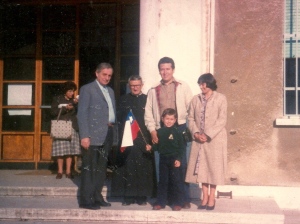In the past 48 hours I have had the uncanny luck of catchy two random summons of art history. It’s a cheap shot, but the first encounter was pretty lame. I won’t get into the chain of events that led to When in Rome (2010) appearing on my DVR, but it was there and I watched it. I actually find Kristen Bell kind of endearing. That is until this scene.
Film
Missed Roman Holiday
A few months before I was born my family went to Italy to witness the beatification of Don Orione, the namesake of my brother’s school at the time. My mom loved recounting how since she was pregnant with me people were always touching her stomach and someone even said her baby would be very religious. As long as I can remember these anecdotes annoyed me to no end: I couldn’t believe my family went on this European holiday without me. Continue reading
Seven Stages of Discovering a New Reference
A few years ago I attended a two-day academic writing workshop that changed my life. Dr. Leslie Jarmon’s advice on outlining was genius and a technique I still use. But try as I might, I cannot “close the gate.” One of Dr. Jarmon’s key recommendations was to set a deadline for reading your references and once that day came you had to close the gate and ideally never open it again. In principle I have absolutely no problem with closing the gate. Though I enjoy squirreling away references like any good researcher I am resolute about deadlines. But in practice it is impossible to close the gate. Continue reading
Time for Some Zweig
I may be the last person to know about Wes Anderson’s upcoming film, The Grand Budapest Hotel, but reading about the film last night in The Daily Beast was revelatory and thrilling. Anderson is a fan of Stefan Zweig! One of the highlights of my dissertation research has been discovering Zweig. Even though he doesn’t factor at all in the nuts and bolts of my text, he’s a huge influence. Zweig’s Magellan biography—available for free on the Internet Archive—was an utter delight and I’m motivated more than ever to finally read Amerigo: A Comedy of Errors. I hope Jason Diamond’s optimistic prediction, of Americans falling for Zweig after seeing The Grand Budapest Hotel, comes true.
